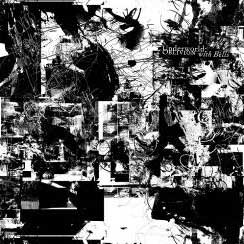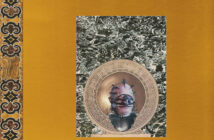The arppegiating synths chime, the four-to-the-floor kick bounces in, the off-beat hi-hat stammers then falls into line – ahh, yep, it’s Underworld by numbers. But then, something interesting happens – the twinkling synth fades, some off kilter percussion plods into focus, then this bizarre, dirty bassline kicks in. Not trashy-electro-pop-dirty, but genuinely odd-dirty, like a short loop of the sound of some gargantuan cicada rubbing its legs to melodic effect. That opening synth salvo was just a sonic in-joke. “Is that you?/Is that really you?” The band’s knack for the epic, expectation shifting opening track is still in effect and ‘Crocodile’ is way up there, even by Underworld’s lofty standards.
It’s been five years since the last full release of new material, but, in the meantime, the band have been anything but resting. A couple of soundtracks and three mini-albums worth of download-only releases exploring extended ambience, bit-crunched rhythms and analogue synth pad twisting have built up to Oblivion With Bells‘s seamless mesh of all these facets of the band’s identity. There’s always been a darkness to Underworld’s music, but the overall mood veers towards menace in many of the tracks on Oblivion With Bells, as opposed to the usual melancholy. Smooth jazz improvisations, for example, can’t mask the relentless anxiety of ‘Holding The Moth’. There’s nothing on the album to match the exhilaration of previous songs like ‘2 Months Off’, ‘8-Ball’ or ‘Born Slippy’, the kind of individual tracks Underworld are most famous for, but the consistency of mood is captivating and visceral. It also has the effect of throwing something like the epic lightness of ‘To Heal’, with its beatless bed of processed strings, into even sharper contrast than normal.
Another shift is in the directness of Karl Hyde’s lyrics. Where in the past stream-of-consciousness non-sequiturs have amounted to the full arsenal of lyrical technique, here, a track like ‘Ring Road’ has a logic and directness that is far from the regular impressionistic strokes. “It’s a rush job/It looks good for long enough/Knock ’em out, sell ’em, move on/It’s a fast book and the race is on/To get in, get out, get what you want, get out/It’s the short term/The long term can look after itself.” There is an anger here that lurks comfortably in the sounds constructed from distressed Blade Runner synths and discarded rhythm shards that turn into melodies. And on that note, there is, as always, sonic acknowledgement of inspiration – Vangelis, Steve Reich, Kraftwerk, Eno, even Ricardo Villalobos – without ever resorting to pastiche. This is no mean feat but one which demonstrates a maturity of style and the self-confidence to push rather than rely.
Underworld is no longer the sound of the zeitgeist as it was 10 or 15 years ago. Fashion shifts, but, fortunately, they never played for fashion even when they reached critical mass. So, while the zeitgeist may have shifted to a kind of retro-hedonist cul-de-sac, Underworld have continued to forge a way forward, never falling into the trap of grafting fads. It still sounds like Underworld but it is progressing and still throwing up new challenges to their musical peers. It’s also interesting that, in an age where the iPod is disintegrating the notion of the album, Underworld – a band who made its name playing music normally associated with one-off dancefloor tracks – manages to put forth such a strong and consistent argument for the place of the album, even the concept of the album. This is an engaging, intellectual and physical alternative vision of where popular music can be outside of the narrow, well marketed alterna-mainstream.
Adrian Elmer




